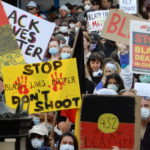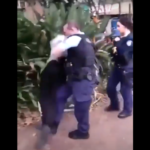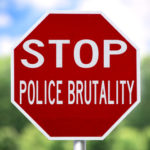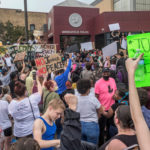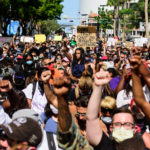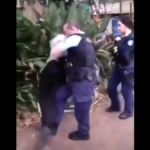Against Police Brutality: Another Video Emerges of Police Assaulting Indigenous Man
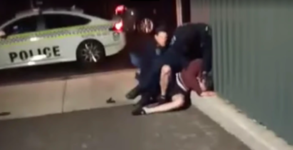
This week, another video has surfaced showing the violent arrest of an Indigenous man by police, leaving many asking whether or not the recent protests in support of Black Lives Matter have actually had any impact, especially where it’s needed the most.
After the video surfaced on social media, the South Australian Police Force had to fess up. Yes, the organisation said the footage of the arrest of a 28-year old Aboriginal man did appear to show an officer repeatedly striking the man while he was on the ground.
It also trotted out the same old line: ‘An internal investigation is underway.’
Henry Noel was stopped by police for riding a bike with no helmet and no light after leaving a friend’s flat. Witnesses say that officers had him pinned to the ground, and when one concerned bystander moved towards Police she was sprayed with pepper spray at close range.
The video footage actually shows an officer telling Mr Henry to “get on the fucking ground” before striking him in the face. Another shows an officer striking him twice.
Mr Henry was charged with resisting arrest, it’s understood that Police did not issue any fines or charges relating to his bicycle. But there’s more to the story.
In its defence, the South Australian Police Force (SAPOL) issued a statement explaining that officers had attended an address nearby for domestic violence matter involving a woman being taken to hospital and the offender being unidentified at the time.
It also said: “As police approached the address they saw a man leaving the area of the house on a bicycle. Police at this time advised the man that they had suspicions concerning him being in possession of illicit drugs. He was asked to place his hands on his head while a search of his person was undertaken.”
The man began to resist the arrest and a struggle ensued. The man “went to the ground as police attempted to restrain and handcuff him.”
According to the SAPOL statement, one officer’s body camera was destroyed during the scuffle and that “agitated” nearby residents confronted the officers, who called for further police assistance before deploying pepper spray.
Mr Henry is due to appear in court this week. He was released from custody the night he was arrested after a group of advocates against Deaths In Custody went to the Police station to see him.
No access to support
One of the recommendations of the Royal Commission into Indigenous Deaths in Custody in 1991was the establishment of the Custody Notification Scheme (CNS), a 24-hour legal advice and support telephone hotline which must be made available to any Australian Aboriginal person brought into custody, connecting them with lawyers from the Aboriginal Legal Service.
The sole purpose of this service is to connect Indigenous people with support as soon as possible, and to counter any potential institutional racism. Over time, the statistics show that it has been very successful in this regard.
But CEO of Aboriginal Legal Rights Movement (ALRM), the organisation which runs the South Australian equivalent of the Custody Notification Scheme, said her organisation made repeated attempts to speak with Mr Henry while he was in custody, but was only informed that he would appear in court this week.
And it is this kind of disregard for following protocols, no matter how minor they seem, which has led to deaths in custody. There are many examples of Indigenous people who died as a result of not being checked frequently, and in accordance with procedure, or having injuries that required more medical care than they were given access to – the list goes on. Time and again, after a coroner’s examination, a litany of errors is uncovered, and in many cases, appropriate policy has not been followed.
Mr Henry’s fate could have been entirely different, and that is exactly the point that thousands of Australians have been trying to make in recent weeks, taking to the streets and social media. Despite the threat of coronavirus still being present, those people who marched in rallies around the country risked their health because they believed this was an issue that has been ignored too long.
Unfortunately, it would appear that those who need to hear it most – those in positions of authority – are still ignoring it.
In recent weeks, several politicians including our own Prime Minister Scott Morrison have been quite vocal in their condemnation of any racism directed towards Asians as a result of the global Covid-19 pandemic which began in China.
Comparatively, The PM’s conversation around systemic racism in society, in policing and the justice system around the BLM protests has been pretty swift and generalised, with a focus on indigenous incarceration rates and closing-the-gap targets.
And this only exacerbates the problem. Tweets, and radio interview sound bites might placate the public momentarily (or in the case of his remarks about slavery not existing in Australia, cause a severe backlash) it’s not going to move the issue into a place where real solutions can be found.
The fact of the matter is that this is the 21st Century and to it’s eternal shame Australia is still failing it’s indigenous people by every socio-economic measure. Indigenous Australians are incarcerated at alarming rates and too many of them die in custody as a result.
Most Australians agree that it’s well past time that we actually did better. Black Lives Matter.

